Military-To-Civilian Resume Examples

Mar 24, 2025
|
12 min read
Craft your military-to-civilian resume with precision and ease. Clear the path to your new career by translating your skills for civilian roles. This guide will help you march toward success in the civilian job market.
Rated by 348 people
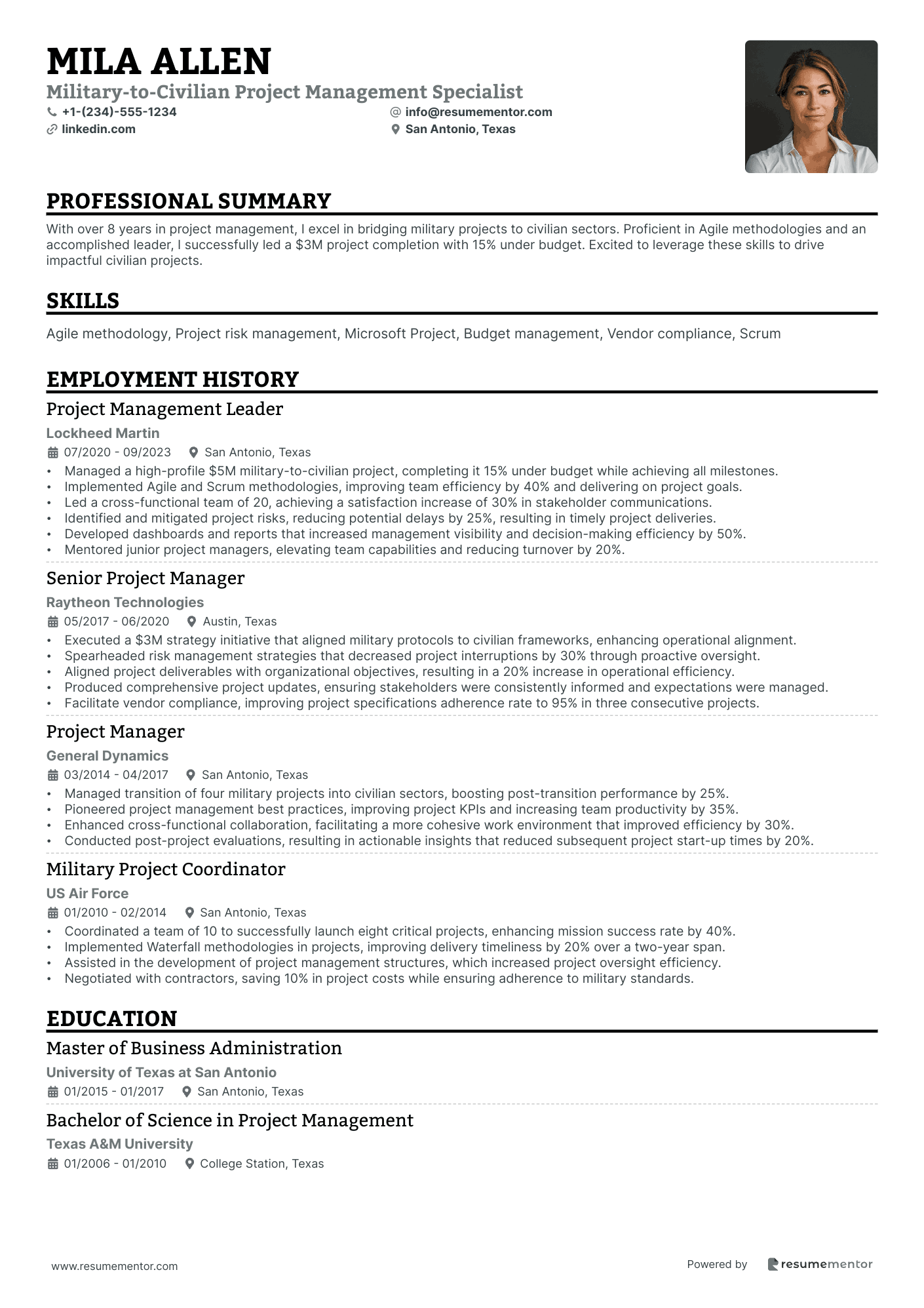
Military-to-Civilian Project Management Specialist
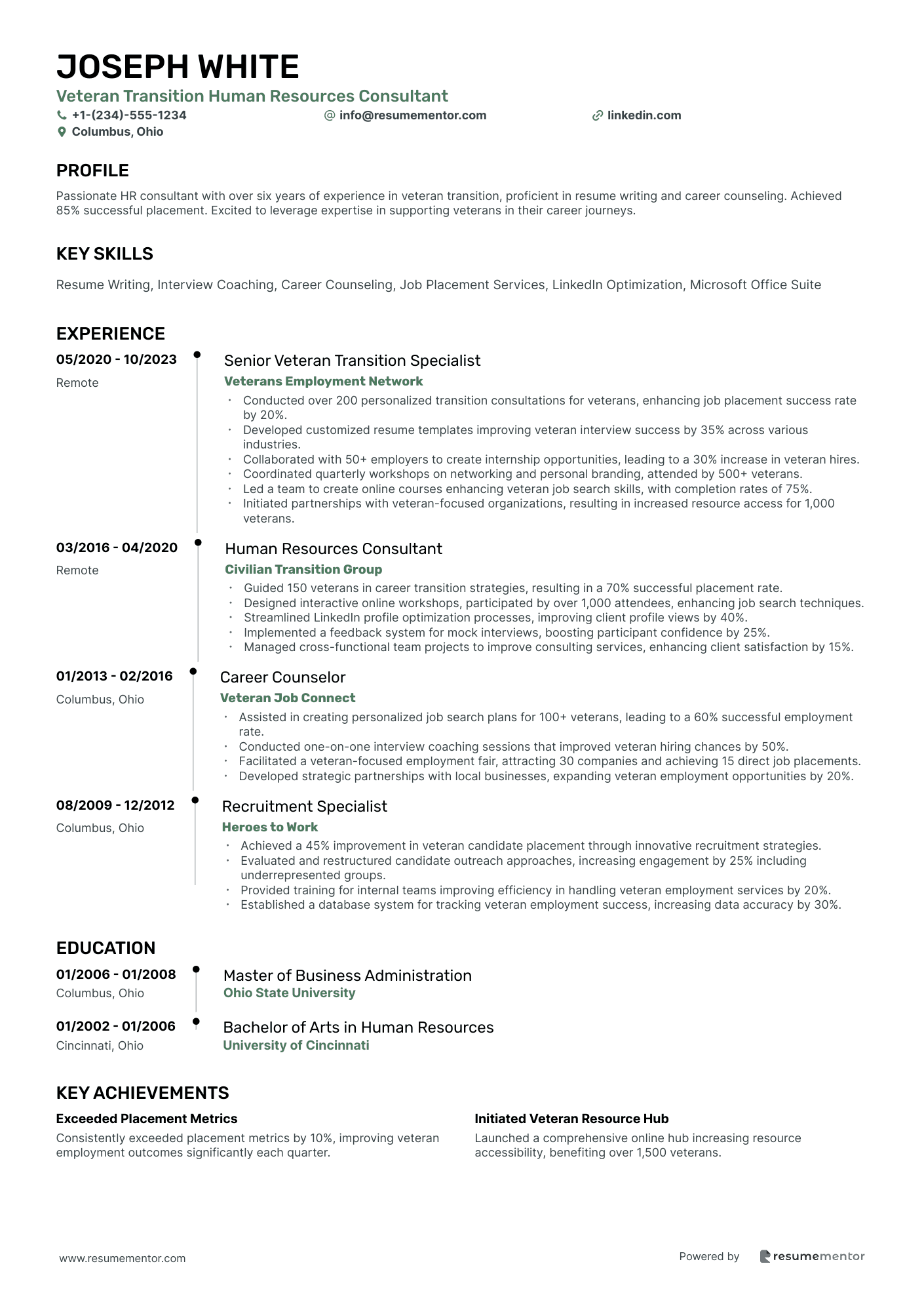
Veteran Transition Human Resources Consultant
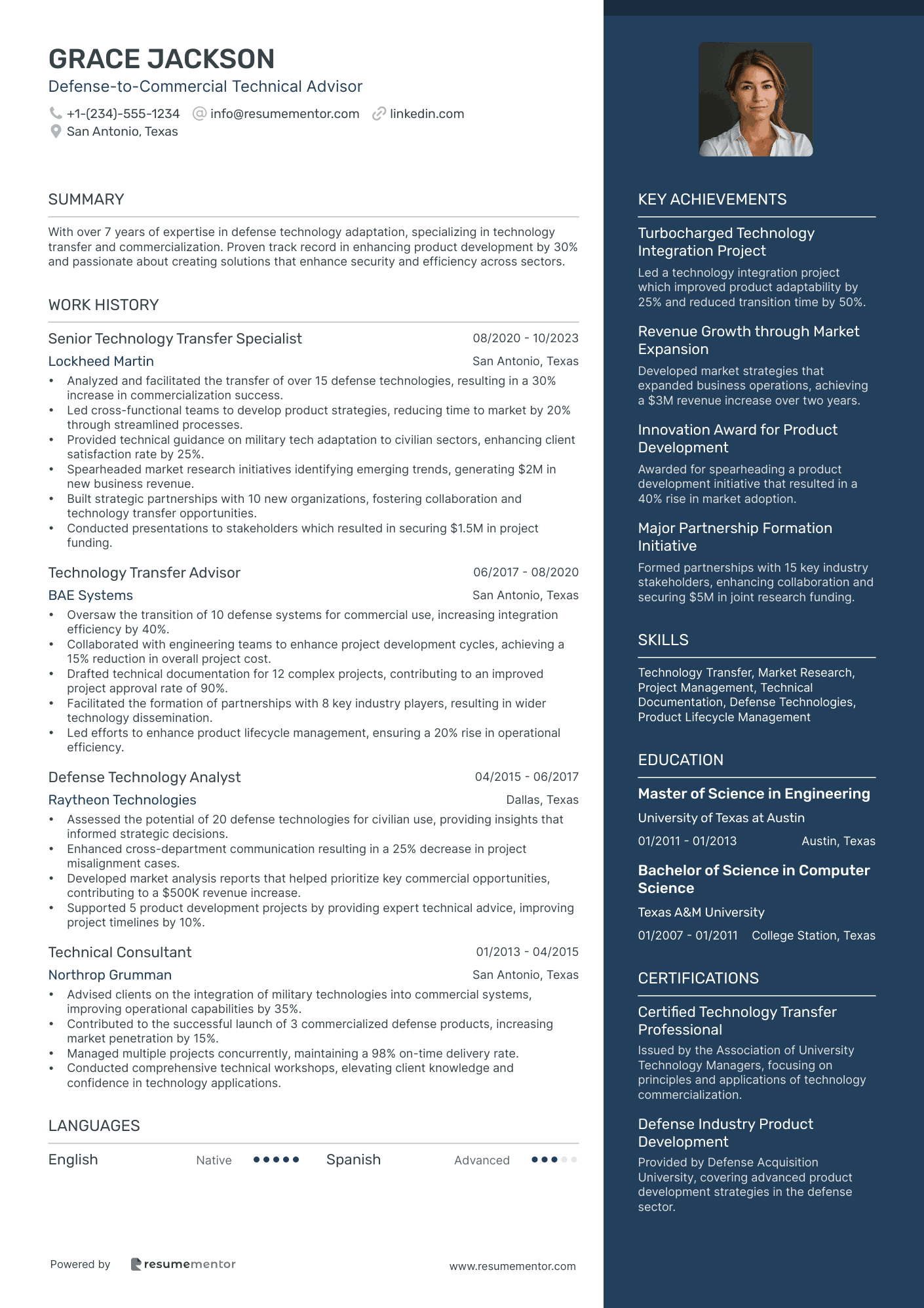
Defense-to-Commercial Technical Advisor
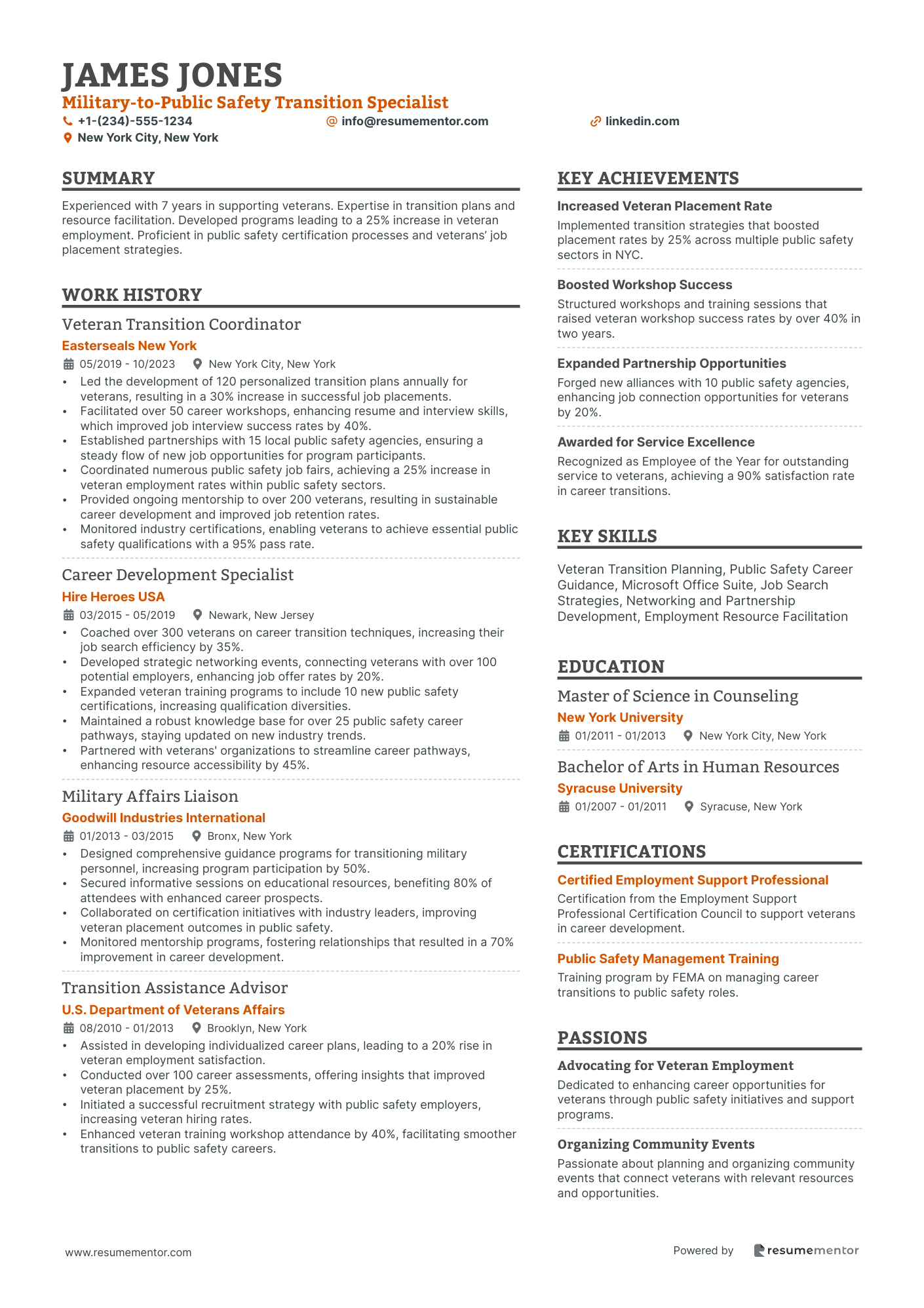
Military-to-Public Safety Transition Specialist
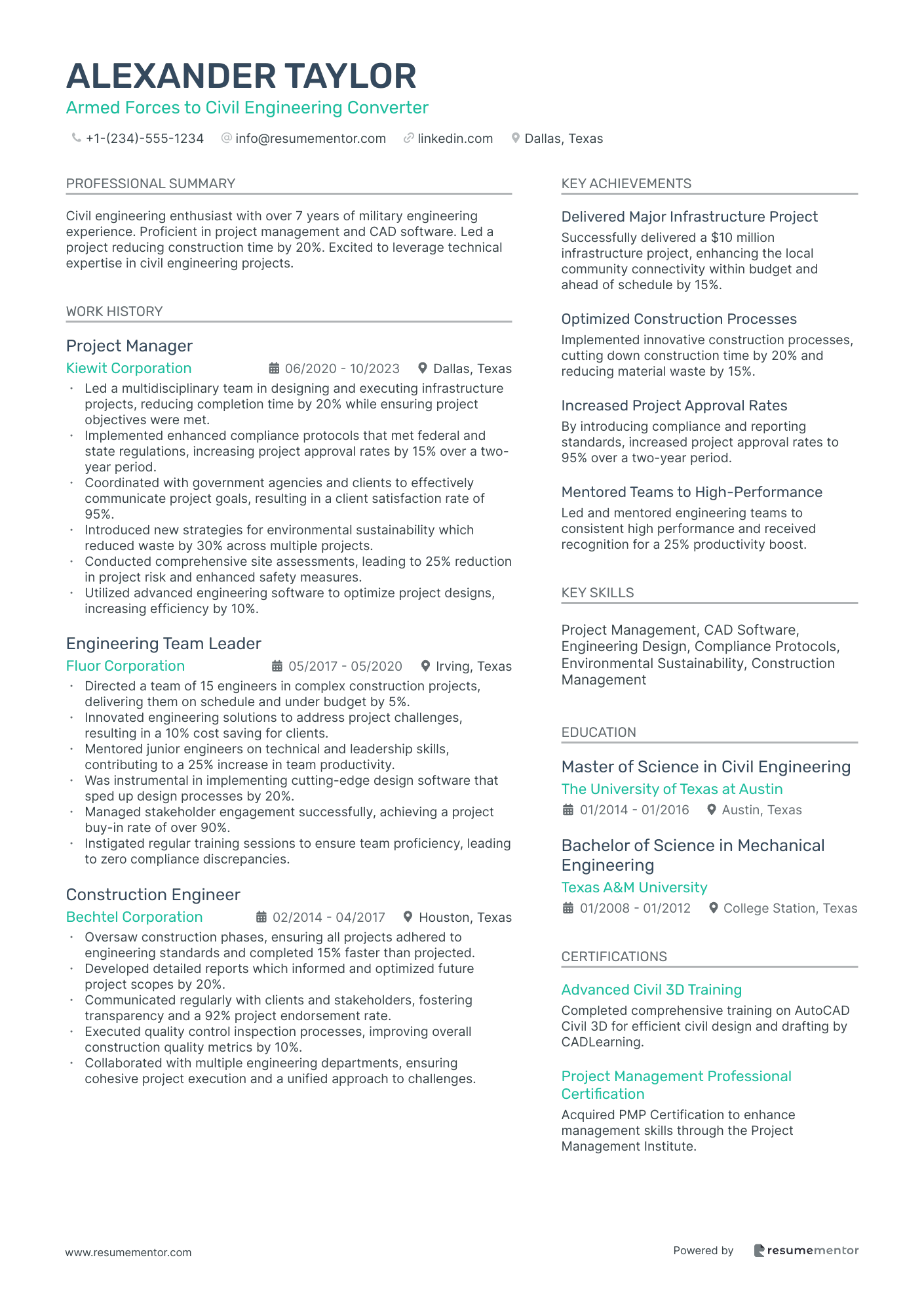
Armed Forces to Civil Engineering Converter
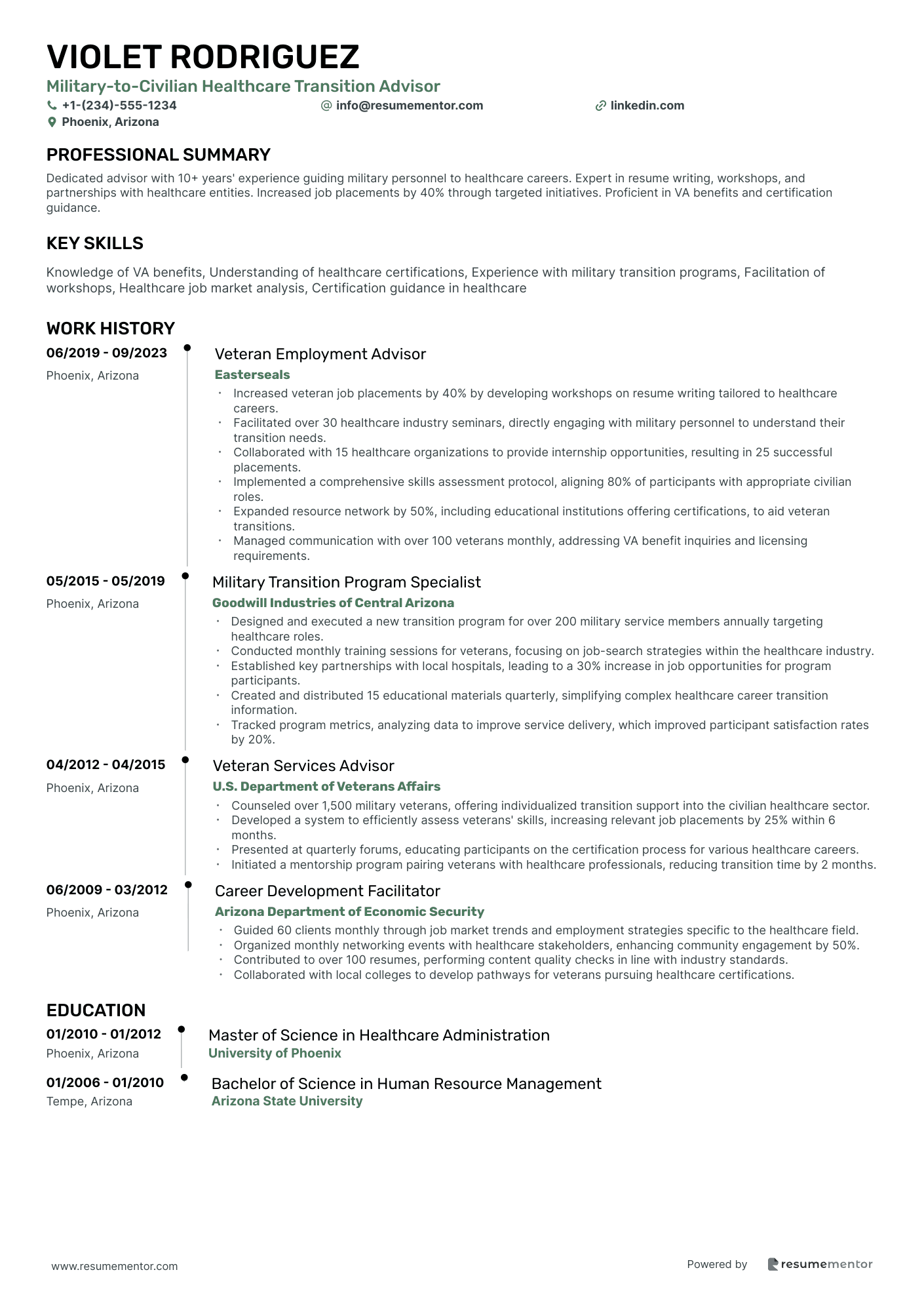
Military-to-Civilian Healthcare Transition Advisor
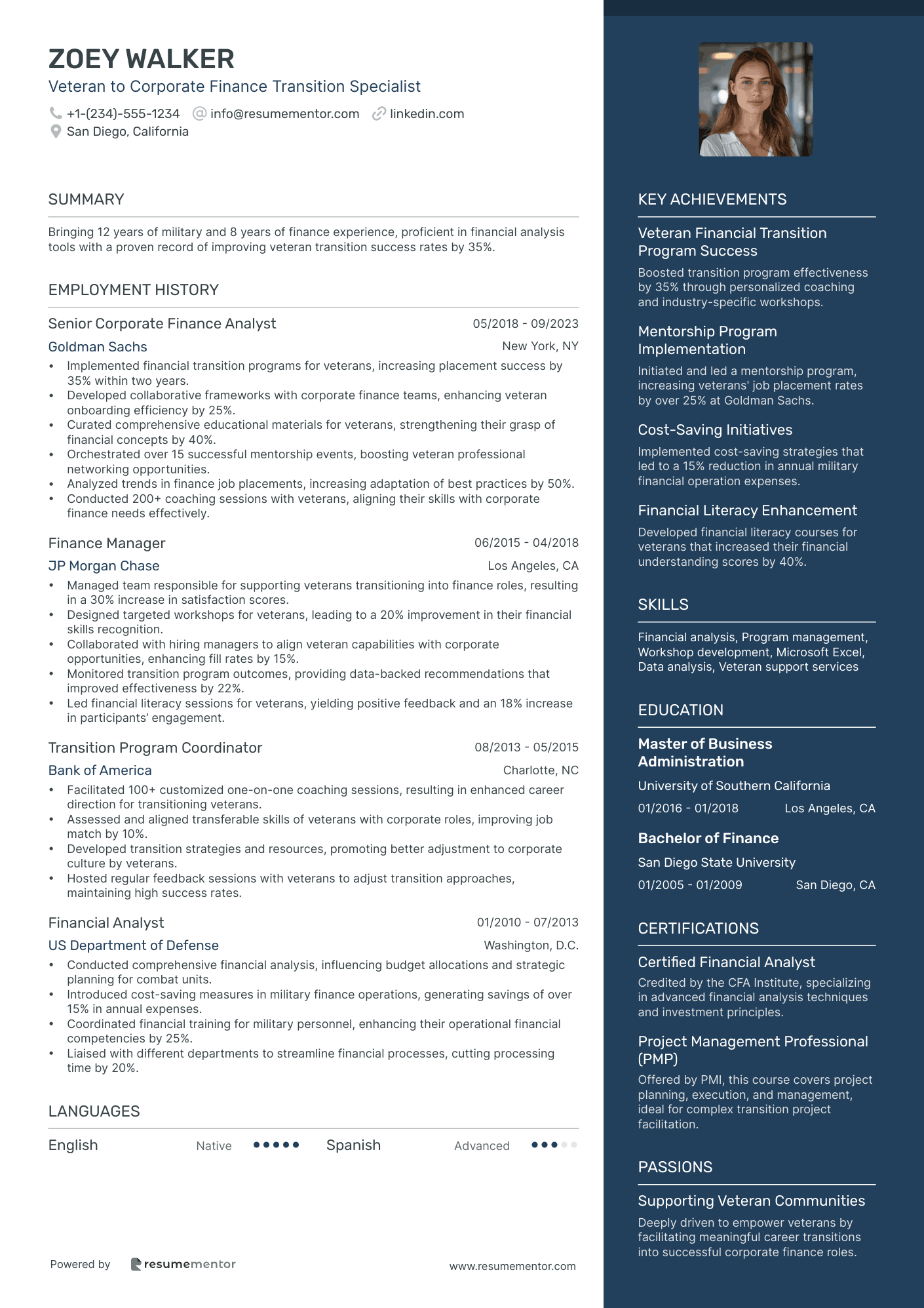
Veteran to Corporate Finance Transition Specialist
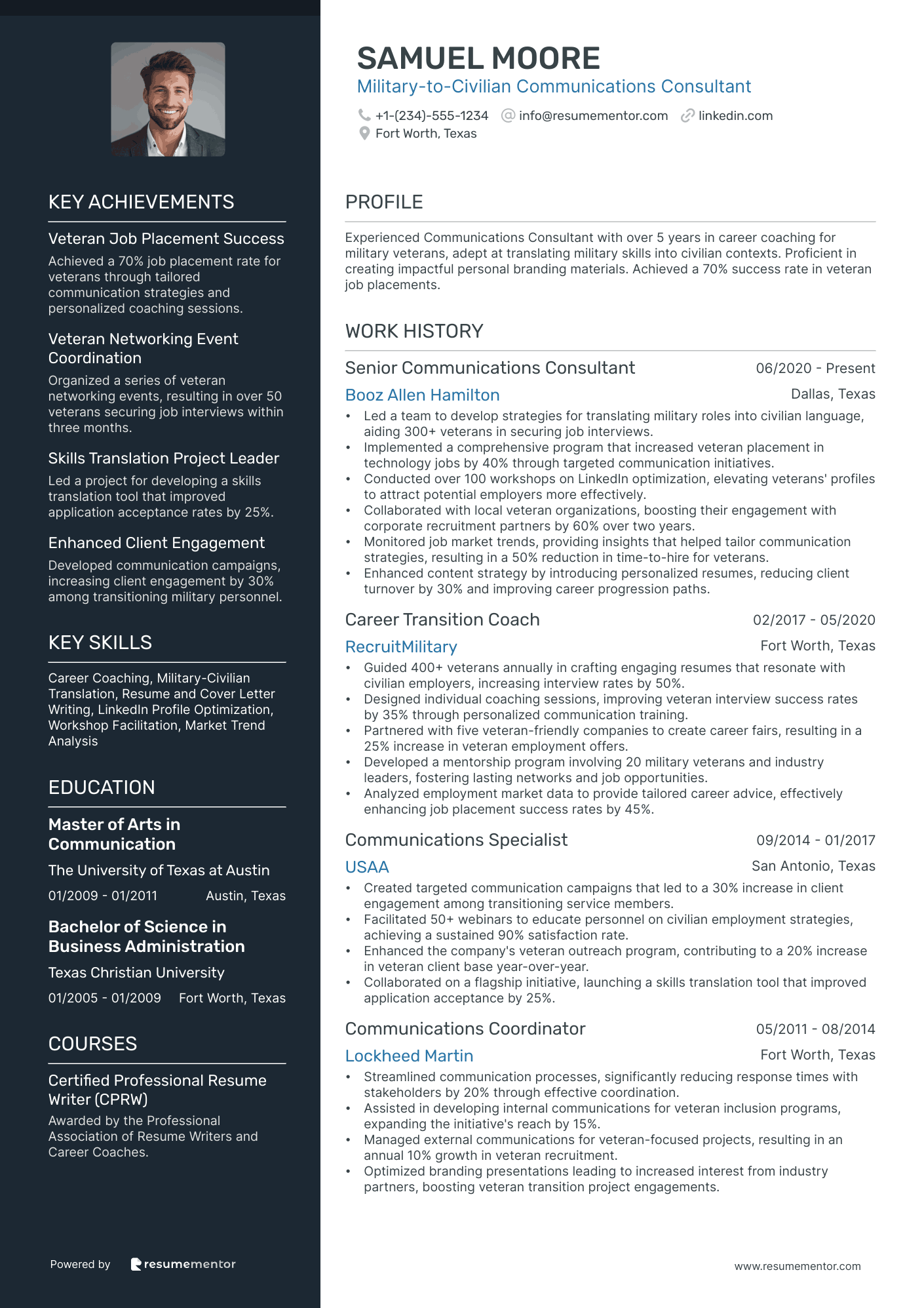
Military-to-Civilian Communications Consultant
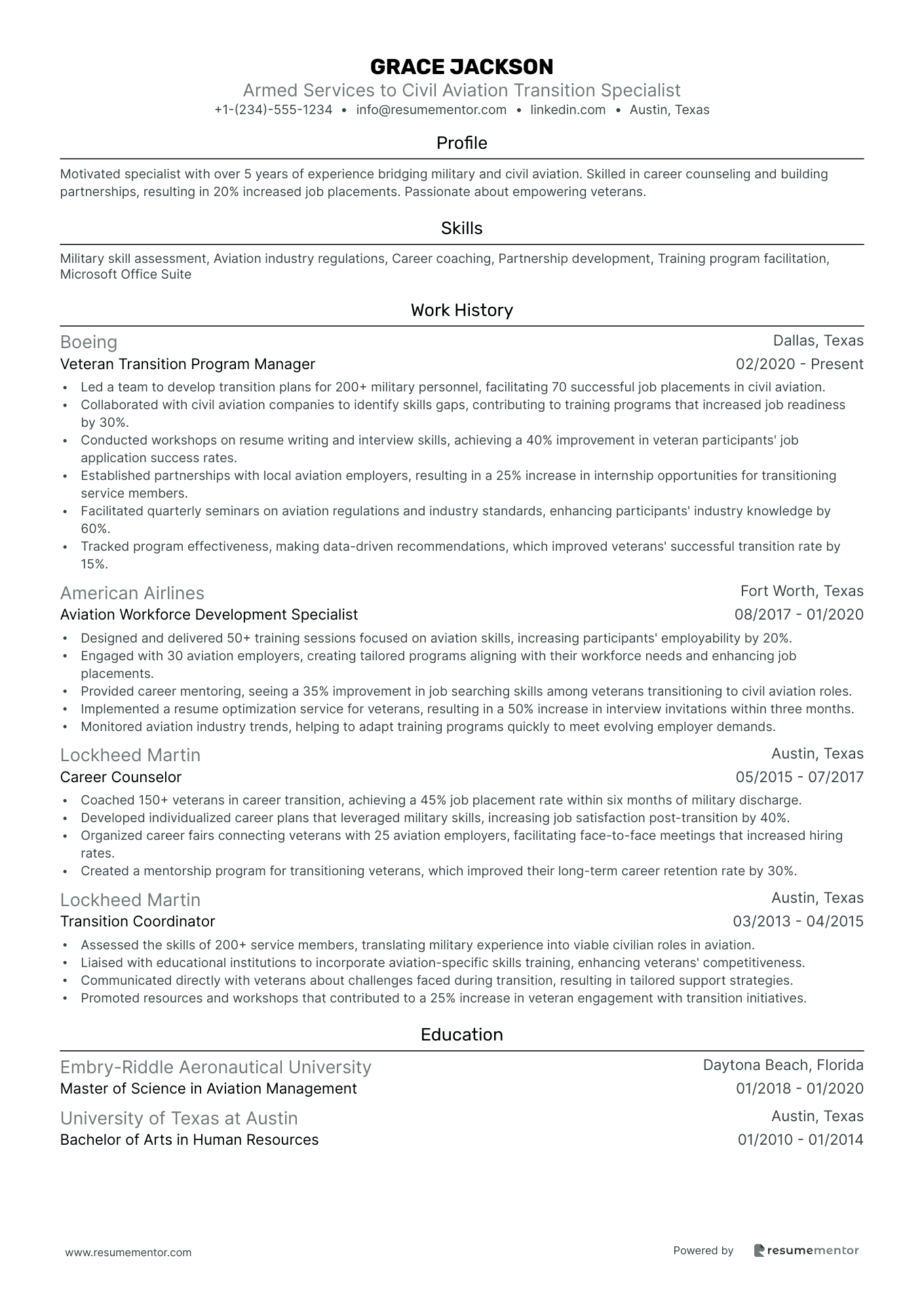
Armed Services to Civil Aviation Transition Specialist
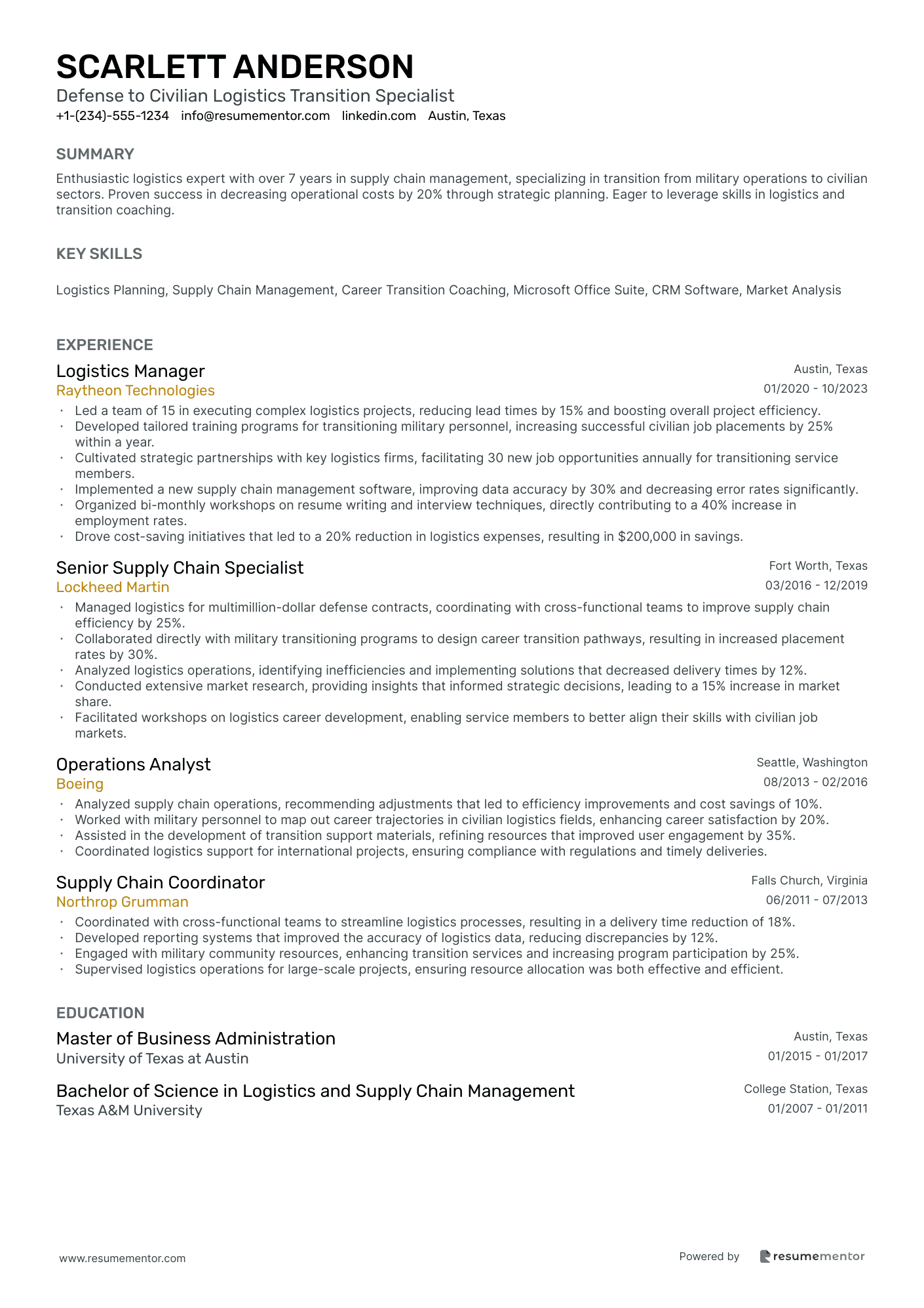
Defense to Civilian Logistics Transition Specialist

Military-to-Civilian Project Management Specialist resume sample
- •Managed a high-profile $5M military-to-civilian project, completing it 15% under budget while achieving all milestones.
- •Implemented Agile and Scrum methodologies, improving team efficiency by 40% and delivering on project goals.
- •Led a cross-functional team of 20, achieving a satisfaction increase of 30% in stakeholder communications.
- •Identified and mitigated project risks, reducing potential delays by 25%, resulting in timely project deliveries.
- •Developed dashboards and reports that increased management visibility and decision-making efficiency by 50%.
- •Mentored junior project managers, elevating team capabilities and reducing turnover by 20%.
- •Executed a $3M strategy initiative that aligned military protocols to civilian frameworks, enhancing operational alignment.
- •Spearheaded risk management strategies that decreased project interruptions by 30% through proactive oversight.
- •Aligned project deliverables with organizational objectives, resulting in a 20% increase in operational efficiency.
- •Produced comprehensive project updates, ensuring stakeholders were consistently informed and expectations were managed.
- •Facilitate vendor compliance, improving project specifications adherence rate to 95% in three consecutive projects.
- •Managed transition of four military projects into civilian sectors, boosting post-transition performance by 25%.
- •Pioneered project management best practices, improving project KPIs and increasing team productivity by 35%.
- •Enhanced cross-functional collaboration, facilitating a more cohesive work environment that improved efficiency by 30%.
- •Conducted post-project evaluations, resulting in actionable insights that reduced subsequent project start-up times by 20%.
- •Coordinated a team of 10 to successfully launch eight critical projects, enhancing mission success rate by 40%.
- •Implemented Waterfall methodologies in projects, improving delivery timeliness by 20% over a two-year span.
- •Assisted in the development of project management structures, which increased project oversight efficiency.
- •Negotiated with contractors, saving 10% in project costs while ensuring adherence to military standards.
Veteran Transition Human Resources Consultant resume sample
- •Conducted over 200 personalized transition consultations for veterans, enhancing job placement success rate by 20%.
- •Developed customized resume templates improving veteran interview success by 35% across various industries.
- •Collaborated with 50+ employers to create internship opportunities, leading to a 30% increase in veteran hires.
- •Coordinated quarterly workshops on networking and personal branding, attended by 500+ veterans.
- •Led a team to create online courses enhancing veteran job search skills, with completion rates of 75%.
- •Initiated partnerships with veteran-focused organizations, resulting in increased resource access for 1,000 veterans.
- •Guided 150 veterans in career transition strategies, resulting in a 70% successful placement rate.
- •Designed interactive online workshops, participated by over 1,000 attendees, enhancing job search techniques.
- •Streamlined LinkedIn profile optimization processes, improving client profile views by 40%.
- •Implemented a feedback system for mock interviews, boosting participant confidence by 25%.
- •Managed cross-functional team projects to improve consulting services, enhancing client satisfaction by 15%.
- •Assisted in creating personalized job search plans for 100+ veterans, leading to a 60% successful employment rate.
- •Conducted one-on-one interview coaching sessions that improved veteran hiring chances by 50%.
- •Facilitated a veteran-focused employment fair, attracting 30 companies and achieving 15 direct job placements.
- •Developed strategic partnerships with local businesses, expanding veteran employment opportunities by 20%.
- •Achieved a 45% improvement in veteran candidate placement through innovative recruitment strategies.
- •Evaluated and restructured candidate outreach approaches, increasing engagement by 25% including underrepresented groups.
- •Provided training for internal teams improving efficiency in handling veteran employment services by 20%.
- •Established a database system for tracking veteran employment success, increasing data accuracy by 30%.
Defense-to-Commercial Technical Advisor resume sample
- •Analyzed and facilitated the transfer of over 15 defense technologies, resulting in a 30% increase in commercialization success.
- •Led cross-functional teams to develop product strategies, reducing time to market by 20% through streamlined processes.
- •Provided technical guidance on military tech adaptation to civilian sectors, enhancing client satisfaction rate by 25%.
- •Spearheaded market research initiatives identifying emerging trends, generating $2M in new business revenue.
- •Built strategic partnerships with 10 new organizations, fostering collaboration and technology transfer opportunities.
- •Conducted presentations to stakeholders which resulted in securing $1.5M in project funding.
- •Oversaw the transition of 10 defense systems for commercial use, increasing integration efficiency by 40%.
- •Collaborated with engineering teams to enhance project development cycles, achieving a 15% reduction in overall project cost.
- •Drafted technical documentation for 12 complex projects, contributing to an improved project approval rate of 90%.
- •Facilitated the formation of partnerships with 8 key industry players, resulting in wider technology dissemination.
- •Led efforts to enhance product lifecycle management, ensuring a 20% rise in operational efficiency.
- •Assessed the potential of 20 defense technologies for civilian use, providing insights that informed strategic decisions.
- •Enhanced cross-department communication resulting in a 25% decrease in project misalignment cases.
- •Developed market analysis reports that helped prioritize key commercial opportunities, contributing to a $500K revenue increase.
- •Supported 5 product development projects by providing expert technical advice, improving project timelines by 10%.
- •Advised clients on the integration of military technologies into commercial systems, improving operational capabilities by 35%.
- •Contributed to the successful launch of 3 commercialized defense products, increasing market penetration by 15%.
- •Managed multiple projects concurrently, maintaining a 98% on-time delivery rate.
- •Conducted comprehensive technical workshops, elevating client knowledge and confidence in technology applications.
Military-to-Public Safety Transition Specialist resume sample
- •Led the development of 120 personalized transition plans annually for veterans, resulting in a 30% increase in successful job placements.
- •Facilitated over 50 career workshops, enhancing resume and interview skills, which improved job interview success rates by 40%.
- •Established partnerships with 15 local public safety agencies, ensuring a steady flow of new job opportunities for program participants.
- •Coordinated numerous public safety job fairs, achieving a 25% increase in veteran employment rates within public safety sectors.
- •Provided ongoing mentorship to over 200 veterans, resulting in sustainable career development and improved job retention rates.
- •Monitored industry certifications, enabling veterans to achieve essential public safety qualifications with a 95% pass rate.
- •Coached over 300 veterans on career transition techniques, increasing their job search efficiency by 35%.
- •Developed strategic networking events, connecting veterans with over 100 potential employers, enhancing job offer rates by 20%.
- •Expanded veteran training programs to include 10 new public safety certifications, increasing qualification diversities.
- •Maintained a robust knowledge base for over 25 public safety career pathways, staying updated on new industry trends.
- •Partnered with veterans' organizations to streamline career pathways, enhancing resource accessibility by 45%.
- •Designed comprehensive guidance programs for transitioning military personnel, increasing program participation by 50%.
- •Secured informative sessions on educational resources, benefiting 80% of attendees with enhanced career prospects.
- •Collaborated on certification initiatives with industry leaders, improving veteran placement outcomes in public safety.
- •Monitored mentorship programs, fostering relationships that resulted in a 70% improvement in career development.
- •Assisted in developing individualized career plans, leading to a 20% rise in veteran employment satisfaction.
- •Conducted over 100 career assessments, offering insights that improved veteran placement by 25%.
- •Initiated a successful recruitment strategy with public safety employers, increasing veteran hiring rates.
- •Enhanced veteran training workshop attendance by 40%, facilitating smoother transitions to public safety careers.
Armed Forces to Civil Engineering Converter resume sample
- •Led a multidisciplinary team in designing and executing infrastructure projects, reducing completion time by 20% while ensuring project objectives were met.
- •Implemented enhanced compliance protocols that met federal and state regulations, increasing project approval rates by 15% over a two-year period.
- •Coordinated with government agencies and clients to effectively communicate project goals, resulting in a client satisfaction rate of 95%.
- •Introduced new strategies for environmental sustainability which reduced waste by 30% across multiple projects.
- •Conducted comprehensive site assessments, leading to 25% reduction in project risk and enhanced safety measures.
- •Utilized advanced engineering software to optimize project designs, increasing efficiency by 10%.
- •Directed a team of 15 engineers in complex construction projects, delivering them on schedule and under budget by 5%.
- •Innovated engineering solutions to address project challenges, resulting in a 10% cost saving for clients.
- •Mentored junior engineers on technical and leadership skills, contributing to a 25% increase in team productivity.
- •Was instrumental in implementing cutting-edge design software that sped up design processes by 20%.
- •Managed stakeholder engagement successfully, achieving a project buy-in rate of over 90%.
- •Instigated regular training sessions to ensure team proficiency, leading to zero compliance discrepancies.
- •Oversaw construction phases, ensuring all projects adhered to engineering standards and completed 15% faster than projected.
- •Developed detailed reports which informed and optimized future project scopes by 20%.
- •Communicated regularly with clients and stakeholders, fostering transparency and a 92% project endorsement rate.
- •Executed quality control inspection processes, improving overall construction quality metrics by 10%.
- •Collaborated with multiple engineering departments, ensuring cohesive project execution and a unified approach to challenges.
- •Designed and implemented engineering systems which improved operational efficiency by 15%.
- •Worked directly with military projects, translating defense requirements into engineering solutions, resulting in a 25% cost efficiency.
- •Delivered technical support for ongoing projects, ensuring seamless operation and decreasing downtime by 10%.
- •Interfaced with cross-functional teams to evaluate system performance, enhancing integration capabilities significantly.
Military-to-Civilian Healthcare Transition Advisor resume sample
- •Increased veteran job placements by 40% by developing workshops on resume writing tailored to healthcare careers.
- •Facilitated over 30 healthcare industry seminars, directly engaging with military personnel to understand their transition needs.
- •Collaborated with 15 healthcare organizations to provide internship opportunities, resulting in 25 successful placements.
- •Implemented a comprehensive skills assessment protocol, aligning 80% of participants with appropriate civilian roles.
- •Expanded resource network by 50%, including educational institutions offering certifications, to aid veteran transitions.
- •Managed communication with over 100 veterans monthly, addressing VA benefit inquiries and licensing requirements.
- •Designed and executed a new transition program for over 200 military service members annually targeting healthcare roles.
- •Conducted monthly training sessions for veterans, focusing on job-search strategies within the healthcare industry.
- •Established key partnerships with local hospitals, leading to a 30% increase in job opportunities for program participants.
- •Created and distributed 15 educational materials quarterly, simplifying complex healthcare career transition information.
- •Tracked program metrics, analyzing data to improve service delivery, which improved participant satisfaction rates by 20%.
- •Counseled over 1,500 military veterans, offering individualized transition support into the civilian healthcare sector.
- •Developed a system to efficiently assess veterans' skills, increasing relevant job placements by 25% within 6 months.
- •Presented at quarterly forums, educating participants on the certification process for various healthcare careers.
- •Initiated a mentorship program pairing veterans with healthcare professionals, reducing transition time by 2 months.
- •Guided 60 clients monthly through job market trends and employment strategies specific to the healthcare field.
- •Organized monthly networking events with healthcare stakeholders, enhancing community engagement by 50%.
- •Contributed to over 100 resumes, performing content quality checks in line with industry standards.
- •Collaborated with local colleges to develop pathways for veterans pursuing healthcare certifications.
Veteran to Corporate Finance Transition Specialist resume sample
- •Implemented financial transition programs for veterans, increasing placement success by 35% within two years.
- •Developed collaborative frameworks with corporate finance teams, enhancing veteran onboarding efficiency by 25%.
- •Curated comprehensive educational materials for veterans, strengthening their grasp of financial concepts by 40%.
- •Orchestrated over 15 successful mentorship events, boosting veteran professional networking opportunities.
- •Analyzed trends in finance job placements, increasing adaptation of best practices by 50%.
- •Conducted 200+ coaching sessions with veterans, aligning their skills with corporate finance needs effectively.
- •Managed team responsible for supporting veterans transitioning into finance roles, resulting in a 30% increase in satisfaction scores.
- •Designed targeted workshops for veterans, leading to a 20% improvement in their financial skills recognition.
- •Collaborated with hiring managers to align veteran capabilities with corporate opportunities, enhancing fill rates by 15%.
- •Monitored transition program outcomes, providing data-backed recommendations that improved effectiveness by 22%.
- •Led financial literacy sessions for veterans, yielding positive feedback and an 18% increase in participants’ engagement.
- •Facilitated 100+ customized one-on-one coaching sessions, resulting in enhanced career direction for transitioning veterans.
- •Assessed and aligned transferable skills of veterans with corporate roles, improving job match by 10%.
- •Developed transition strategies and resources, promoting better adjustment to corporate culture by veterans.
- •Hosted regular feedback sessions with veterans to adjust transition approaches, maintaining high success rates.
- •Conducted comprehensive financial analysis, influencing budget allocations and strategic planning for combat units.
- •Introduced cost-saving measures in military finance operations, generating savings of over 15% in annual expenses.
- •Coordinated financial training for military personnel, enhancing their operational financial competencies by 25%.
- •Liaised with different departments to streamline financial processes, cutting processing time by 20%.
Military-to-Civilian Communications Consultant resume sample
- •Led a team to develop strategies for translating military roles into civilian language, aiding 300+ veterans in securing job interviews.
- •Implemented a comprehensive program that increased veteran placement in technology jobs by 40% through targeted communication initiatives.
- •Conducted over 100 workshops on LinkedIn optimization, elevating veterans' profiles to attract potential employers more effectively.
- •Collaborated with local veteran organizations, boosting their engagement with corporate recruitment partners by 60% over two years.
- •Monitored job market trends, providing insights that helped tailor communication strategies, resulting in a 50% reduction in time-to-hire for veterans.
- •Enhanced content strategy by introducing personalized resumes, reducing client turnover by 30% and improving career progression paths.
- •Guided 400+ veterans annually in crafting engaging resumes that resonate with civilian employers, increasing interview rates by 50%.
- •Designed individual coaching sessions, improving veteran interview success rates by 35% through personalized communication training.
- •Partnered with five veteran-friendly companies to create career fairs, resulting in a 25% increase in veteran employment offers.
- •Developed a mentorship program involving 20 military veterans and industry leaders, fostering lasting networks and job opportunities.
- •Analyzed employment market data to provide tailored career advice, effectively enhancing job placement success rates by 45%.
- •Created targeted communication campaigns that led to a 30% increase in client engagement among transitioning service members.
- •Facilitated 50+ webinars to educate personnel on civilian employment strategies, achieving a sustained 90% satisfaction rate.
- •Enhanced the company's veteran outreach program, contributing to a 20% increase in veteran client base year-over-year.
- •Collaborated on a flagship initiative, launching a skills translation tool that improved application acceptance by 25%.
- •Streamlined communication processes, significantly reducing response times with stakeholders by 20% through effective coordination.
- •Assisted in developing internal communications for veteran inclusion programs, expanding the initiative's reach by 15%.
- •Managed external communications for veteran-focused projects, resulting in an annual 10% growth in veteran recruitment.
- •Optimized branding presentations leading to increased interest from industry partners, boosting veteran transition project engagements.
Armed Services to Civil Aviation Transition Specialist resume sample
- •Led a team to develop transition plans for 200+ military personnel, facilitating 70 successful job placements in civil aviation.
- •Collaborated with civil aviation companies to identify skills gaps, contributing to training programs that increased job readiness by 30%.
- •Conducted workshops on resume writing and interview skills, achieving a 40% improvement in veteran participants' job application success rates.
- •Established partnerships with local aviation employers, resulting in a 25% increase in internship opportunities for transitioning service members.
- •Facilitated quarterly seminars on aviation regulations and industry standards, enhancing participants' industry knowledge by 60%.
- •Tracked program effectiveness, making data-driven recommendations, which improved veterans' successful transition rate by 15%.
- •Designed and delivered 50+ training sessions focused on aviation skills, increasing participants' employability by 20%.
- •Engaged with 30 aviation employers, creating tailored programs aligning with their workforce needs and enhancing job placements.
- •Provided career mentoring, seeing a 35% improvement in job searching skills among veterans transitioning to civil aviation roles.
- •Implemented a resume optimization service for veterans, resulting in a 50% increase in interview invitations within three months.
- •Monitored aviation industry trends, helping to adapt training programs quickly to meet evolving employer demands.
- •Coached 150+ veterans in career transition, achieving a 45% job placement rate within six months of military discharge.
- •Developed individualized career plans that leveraged military skills, increasing job satisfaction post-transition by 40%.
- •Organized career fairs connecting veterans with 25 aviation employers, facilitating face-to-face meetings that increased hiring rates.
- •Created a mentorship program for transitioning veterans, which improved their long-term career retention rate by 30%.
- •Assessed the skills of 200+ service members, translating military experience into viable civilian roles in aviation.
- •Liaised with educational institutions to incorporate aviation-specific skills training, enhancing veterans' competitiveness.
- •Communicated directly with veterans about challenges faced during transition, resulting in tailored support strategies.
- •Promoted resources and workshops that contributed to a 25% increase in veteran engagement with transition initiatives.
Defense to Civilian Logistics Transition Specialist resume sample
- •Led a team of 15 in executing complex logistics projects, reducing lead times by 15% and boosting overall project efficiency.
- •Developed tailored training programs for transitioning military personnel, increasing successful civilian job placements by 25% within a year.
- •Cultivated strategic partnerships with key logistics firms, facilitating 30 new job opportunities annually for transitioning service members.
- •Implemented a new supply chain management software, improving data accuracy by 30% and decreasing error rates significantly.
- •Organized bi-monthly workshops on resume writing and interview techniques, directly contributing to a 40% increase in employment rates.
- •Drove cost-saving initiatives that led to a 20% reduction in logistics expenses, resulting in $200,000 in savings.
- •Managed logistics for multimillion-dollar defense contracts, coordinating with cross-functional teams to improve supply chain efficiency by 25%.
- •Collaborated directly with military transitioning programs to design career transition pathways, resulting in increased placement rates by 30%.
- •Analyzed logistics operations, identifying inefficiencies and implementing solutions that decreased delivery times by 12%.
- •Conducted extensive market research, providing insights that informed strategic decisions, leading to a 15% increase in market share.
- •Facilitated workshops on logistics career development, enabling service members to better align their skills with civilian job markets.
- •Analyzed supply chain operations, recommending adjustments that led to efficiency improvements and cost savings of 10%.
- •Worked with military personnel to map out career trajectories in civilian logistics fields, enhancing career satisfaction by 20%.
- •Assisted in the development of transition support materials, refining resources that improved user engagement by 35%.
- •Coordinated logistics support for international projects, ensuring compliance with regulations and timely deliveries.
- •Coordinated with cross-functional teams to streamline logistics processes, resulting in a delivery time reduction of 18%.
- •Developed reporting systems that improved the accuracy of logistics data, reducing discrepancies by 12%.
- •Engaged with military community resources, enhancing transition services and increasing program participation by 25%.
- •Supervised logistics operations for large-scale projects, ensuring resource allocation was both effective and efficient.
Transitioning from military duty to a civilian role can feel like navigating a new world, and a strong resume is your compass on this journey. The challenge often lies in translating military skills and experiences into terms that civilian employers understand and value.
Your leadership, strategic planning, or specialized skills have immense worth, but communication is key. Using a resume template as your guide can help you effectively highlight and organize these achievements.
Remember, first impressions matter. A well-crafted resume not only helps you stand out but also clearly shows why you're the ideal candidate. Structuring your work history and skills in a readable format is crucial. If you're not sure where to begin, these resume templates are a great place to start.
This guide will offer tips to transform your military experience into terms that resonate with civilian employers. It's about more than just landing a job; it's about finding the right fit for you. The road from military to civilian life is well-traveled, and with the right tools, you'll be ready to step confidently into your next adventure.
Key Takeaways
- Transitioning from military to civilian roles requires effectively translating military skills into civilian terms on a resume.
- A clear, well-structured resume highlighting leadership, problem-solving, and adaptability is crucial for making a strong first impression.
- Sections such as skills, military experience, education, and certifications should use civilian-friendly language to showcase your qualifications.
- Choosing the right resume format, such as a functional one, can help emphasize valuable skills when specific military roles don’t align directly with civilian jobs.
- Extra sections like volunteer work, languages, and hobbies can add depth to your resume, presenting you as a well-rounded candidate.
What to focus on when writing your military-to-civilian resume
A military-to-civilian resume should clearly convey your journey from service to a new career, highlighting the unique skills and experiences you bring. This document should emphasize your adaptability, leadership, and problem-solving abilities, creating a vivid picture for recruiters of how you can thrive in a civilian role. By showcasing how your military skills can lead to civilian job success, your resume demonstrates your readiness for this exciting new chapter.
How to structure your military-to-civilian resume
- Contact Information: Begin with your full name, phone number, and a professional email address to ensure easy communication. Including your LinkedIn profile can provide a more comprehensive view of your professional background—showcasing this information at the top ensures recruiters can reach you quickly.
- Professional Summary: Follow with a brief paragraph about your transition, focusing on the unique value you offer. Here, highlight strengths like leadership, teamwork, and specialized expertise in areas such as logistics or security operations—this summary sets the tone for your entire resume by immediately demonstrating what makes you a strong candidate.
- Skills: Next, list skills that resonate with civilian employers. Emphasize those universally recognized, like strategic planning, crisis management, or project execution, to connect with a wide range of industries—this section serves as a quick reference for recruiters wanting to match your abilities with job requirements.
- Military Experience: Use civilian-friendly language when detailing your military roles to ensure clarity. Highlight leadership, teamwork, and any technical expertise that aligns with civilian job requirements, illustrating your versatility—this part lets recruiters understand the depth of your experience and its relevance to their needs.
- Education: Provide insights into your academic background, listing degrees, certifications, and relevant courses such as management or technology. This connects your educational achievements with your career goals—demonstrating your commitment to lifelong learning and professional development.
- Certifications and Licenses: Round out your qualifications by mentioning any civilian certifications or licenses, like a PMP, which underscore your readiness and commitment to transitioning smoothly into civilian work—these details highlight your proactive approach to gaining qualifications that enhance your career prospects.
Optional sections like "Volunteer Work" or "Awards and Honors" add depth, showcasing your character and achievements outside of your professional life, helping recruiters see you as a well-rounded candidate. In the next section, we'll dive deeper into each resume section to ensure you create a compelling, well-structured document tailored to your transition.
Which resume format to choose
Transitioning from a military to a civilian career can feel like a big leap, and choosing the right resume format can make a huge difference. A functional resume is often your best bet, as it highlights the valuable skills you've gained in the military. This approach focuses on your abilities and achievements, which can bridge the gap when specific military roles don’t directly align with civilian jobs. This is especially important for roles that emphasize leadership, technical skills, or problem-solving.
To further enhance your resume's appeal, consider using modern, clean fonts like Rubik, Montserrat, or Lato. These fonts lend a fresh and contemporary look, making your document more inviting and accessible. A modern font can subtly convey your readiness to transition into civilian roles and align with today's professional standards.
It's also crucial to save your resume as a PDF to ensure your formatting remains consistent across all devices. PDFs preserve your layout exactly as intended, which guarantees your resume appears polished and professional to every employer, regardless of how or where they open it. This reliability can help your application stand out in a competitive job market.
Keeping margins at about one inch on all sides provides a harmonious balance of text and white space, allowing for easy scanning and reading. This layout choice supports the overall clarity of your resume, making sure that critical information doesn't get overlooked by a hiring manager who may only spend a few seconds on each document.
By using straightforward language and emphasizing your skills, you make your strengths stand out in a way that resonates with civilian employers. Tailoring your resume content in this manner helps to naturally draw the attention of hiring managers, showcasing your experience seamlessly and making your qualifications shine in a civilian context.
How to write a quantifiable resume experience section
The experience section of your military-to-civilian resume plays a vital role in showcasing your skills and achievements in terms that civilian employers understand. Start by highlighting your adaptability and success in new environments, using language that aligns with the job description you're interested in. This section should be structured chronologically, beginning with your most recent position. Focus on the past 10-15 years, emphasizing job titles that are relevant to the position you're targeting. Integrating keywords from the job ad helps your resume get through applicant tracking systems seamlessly. Use strong action words such as "managed," "developed," and "implemented" to highlight your contributions effectively.
Emphasize achievements that are quantifiable and directly relevant to the job. Including numbers, such as the size of the team you led or the percentage increase in efficiency, provides concrete evidence of your impact.
- •Boosted logistical efficiency by 30% with a new inventory system.
- •Trained a team of 15 soldiers, raising mission readiness by 25%.
- •Introduced a cost-saving plan, cutting supplies costs by 20%.
- •Enhanced cross-unit collaboration, improving communications by 40%.
This experience section effectively bridges military experience with civilian job requirements by using accessible language and specific achievements. Each bullet point not only showcases your past responsibilities but also ties them to measurable outcomes, reinforcing your effectiveness in roles similar to those in the civilian sector. With its targeted, action-driven language, the section ensures that potential employers quickly see your value, helping you to stand out as a highly adaptable and accomplished candidate ready to transition smoothly into the civilian workforce.
Project-Focused resume experience section
A project-focused resume experience section should effectively convert your military roles into terms that civilian employers can appreciate. Start by showcasing skills and accomplishments that align with your target job using straightforward language. Reflect on key projects you led or supported, detailing their positive impact on your team or organization. Illustrate your contributions and results, employing numbers where possible to convey success and make your achievements more relatable to civilian roles.
Select a clear and concise title that accurately reflects the nature of the project work you handled. In the bullets, use strong action verbs to describe your roles and achievements, emphasizing transferable skills like leadership, teamwork, and problem-solving. Show how you applied these skills in different projects, ensuring that military terms are translated into civilian language. This approach ensures that your accomplishments are easy to understand and appreciate.
Logistics Coordinator
June 2018 - September 2021
- Coordinated logistics operations, boosting efficiency by 20% with optimized supply routes.
- Led a team of 15 in executing a successful supply chain project during a multinational exercise.
- Implemented a tracking system, cutting equipment loss by 30% and saving $50,000 each year.
- Facilitated training sessions for team members, enhancing their operational skills and knowledge.
Technology-Focused resume experience section
A technology-focused resume experience section should translate your military skills into language that resonates with tech industry employers. Begin by identifying the technologies and systems you've handled, and describe how you enhanced them to solve problems. This showcases your problem-solving abilities and demonstrates how you maintained efficiency under pressure. It's also important to highlight leadership and teamwork skills, as these are valuable in the tech sector, helping potential employers understand the depth of your technical experience.
While detailing your experience, be specific by using action verbs and mentioning outcomes or improvements that highlight your impact. Start each example with a clear job title and employment dates, followed by bullet points outlining your key achievements and responsibilities. Every bullet should focus on a different part of your experience, whether that's leading projects, optimizing systems, or managing teams. This method effectively presents the technological skills and accomplishments you've gained through your military service.
Communication Technician
US Army
June 2018 - September 2021
- Managed military communication systems, enhancing security by 30%.
- Led a team of 5 in system upgrades, boosting operational efficiency by 20%.
- Implemented software improvements, cutting system downtime by 50%.
- Trained 15 personnel in new technology applications, increasing team productivity.
Responsibility-Focused resume experience section
A leadership-focused resume experience section should effectively translate your military responsibilities into skills and achievements that resonate with civilian employers. Begin by using language that emphasizes your strengths in leadership, organization, and problem-solving while avoiding military jargon. Opt for terms that are easily understood in the civilian workforce to make your skills relatable. It's crucial to highlight your contributions and achievements, showing potential employers the value you added to your unit and how you can bring similar benefits to their organization.
To showcase your role, describe the essence of your responsibilities, moving beyond just your rank or unit. Break down your tasks into clear, actionable items with measurable results, which will make your resume more compelling. This approach helps hiring managers quickly grasp the impact you can have on their team. Focus on your leadership and project management skills, as well as any technical expertise that relates to your desired civilian role. Here's an example following the specified format:
Team Supervisor
January 2018 - December 2021
- Led a team of 20 personnel, boosting team efficiency by 25%.
- Coordinated logistics for large-scale operations, achieving 100% mission success on time.
- Managed a multimillion-dollar equipment budget, cutting costs by 15% through strategic resource allocation.
- Trained and mentored junior team members, improving skills and enhancing unit readiness.
Industry-Specific Focus resume experience section
A military-to-civilian-focused resume experience section should smoothly translate your military skills into civilian terms, making your qualifications easy to understand. Start by pinpointing the industry focus and draw connections between your military experience and the related civilian skills. Use simple, clear language to portray your military roles, ensuring you avoid jargon that might confuse employers. Instead, focus on universally valued skills such as leadership, problem-solving, and teamwork to effectively demonstrate your abilities.
To craft a cohesive and impressive experience section, ensure that each bullet point highlights a key responsibility or achievement with a focus on outcomes. Keep descriptions concise yet informative, showing the impact your actions had in your roles. Link achievements such as improved processes or training successes directly to your targeted industry, thus enhancing your relevance and appeal. Here’s an example to illustrate this approach:
Logistics Manager
United States Army
Jan 2015 - Mar 2020
- Led a team of over 20 in coordinating supply transportation, which boosted efficiency by 30%.
- Implemented a new inventory tracking system that significantly cut waste by 15%.
- Developed training programs leading to noticeable improvements in team performance and quicker role integration.
- Managed logistics for high-value equipment operations, ensuring zero incidents of loss or damage.
Write your military-to-civilian resume summary section
A transition-focused military-to-civilian resume should effectively highlight how your military experience translates to civilian roles. Crafting a summary that encapsulates your experience, skills, and value in just a few sentences is key. As you move into civilian life, focus on showcasing your transferable skills and leadership strengths. Using clear and simple language helps ensure anyone reading can quickly grasp your abilities. Here’s an example:
This example effectively bridges the gap between military and civilian roles by showcasing practical skills, leadership, and achievements in a way that resonates in logistics or management fields. It’s concise yet comprehensive, giving potential employers a quick overview of your capabilities. When considering how to present yourself in a resume summary, it’s helpful to use action words like "achieved," "led," or "improved" to highlight your contributions. Choosing strong descriptors like "proven" and "experienced" adds impact to your narrative. Tailoring your summary to the specific job you're targeting can enhance your appeal and make you stand out.
Understanding the difference between a summary, an objective, a profile, or a qualifications summary can help refine your focus. A resume objective typically highlights future goals, which is beneficial if you're new to the field. Meanwhile, a resume profile merges a summary with an objective, offering a blend of qualifications and aspirations. A summary of qualifications lists key achievements and skills in bullet points, providing a snapshot of your strengths. Aligning the type of summary you use with your experience and career goals ensures you effectively present what you bring to the table.
Listing your military-to-civilian skills on your resume
A military-focused resume should leverage the skills section to showcase your strengths while transitioning to a civilian career path. Clearly listing your skills helps your resume serve as a powerful tool to catch a hiring manager’s attention. Both hard and soft skills are crucial, acting as essential keywords that elevate your resume and highlight different aspects of your experience. Hard skills, such as technical proficiency or operational strategies, reflect specific abilities that can easily translate into civilian job roles.
Your strengths, including soft skills like leadership and adaptability, illustrate your interpersonal abilities and work ethic. These soft skills add depth, painting a fuller picture of you as a candidate. Skills can be woven throughout your resume—not just in a standalone section but also in your summary and experience areas—to enhance their impact. By strategically presenting your skills and strengths, your resume can bypass software filters while remaining compelling and relevant to civilian employers.
Example skills section in JSON format:
This skills section highlights a mix of abilities crucial for civilian roles, emphasizing technical skills and interpersonal strengths. By steering clear of military jargon and using clear language understood by civilian employers, you broaden your appeal and position yourself as a well-rounded candidate.
Best hard skills to feature on your military-to-civilian resume
Hard skills represent technical abilities gained through practice, training, or education. For transitioning from military to civilian life, these skills should easily translate to civilian roles, showcasing your adaptability and expertise.
Hard Skills
- Strategic Planning
- Data Analysis
- Mechanical Maintenance
- Computer Proficiency
- Security Operations
- Vehicle Operations
- Medical Training
- Cybersecurity
- Systems Evaluation
- Procurement
- Telecommunications
- Foreign Language Proficiency
- Resource Allocation
- Personnel Management
- Quality Control
Best soft skills to feature on your military-to-civilian resume
Soft skills are personal attributes that demonstrate your ability to interact effectively and work well with others. They highlight your flexibility and communication skills, crucial in civilian work settings.
Soft Skills
- Leadership
- Communication
- Decision-making
- Adaptability
- Teamwork
- Problem-solving
- Time Management
- Negotiation
- Patience
- Motivation
- Emotional Intelligence
- Resilience
- Attention to Detail
- Initiative
- Integrity
How to include your education on your resume
An education section is an essential part of any military-to-civilian resume. Your education can highlight your relevant skills and qualifications to potential employers. Tailor it to suit the job you're applying for; omit any irrelevant education to keep it concise and focused. When incorporating GPA, only do so if it highlights your academic strengths, ideally above a 3.0. For those with honors like cum laude, do not just mention it, but use it to emphasize your dedication and academic achievements. Clearly present your degree, listing the full name of the degree, institution, and any noteworthy activities or honors.
Example with errors:
This example incorrectly includes a low GPA and located the location unnecessarily.
Excellent example:
The positive example is effective because it includes a strong GPA and honors that highlight excellence. The degree is relevant to a civilian position, like IT or cybersecurity, ensuring the recruiter sees how your military training aligns with civilian needs. Using clear dates provides a timeline, which is structured yet concise, making it easier for hiring managers to quickly gauge your qualifications.
How to include military-to-civilian certificates on your resume
A certificates section is a crucial part of a military-to-civilian resume because it showcases your specialized skills and qualifications. List the name of each certificate clearly to ensure the employer knows what skills you offer. Include the date each certificate was earned or last renewed to provide a timeline of your learning and development. Add the issuing organization’s name to give credibility to your certificates and highlight their relevance. Certificates can also be placed in the header to instantly catch a hiring manager's attention. For example, if you've earned a Project Management Professional (PMP) certificate, you can note it in your header alongside your contact information.
The example provided is effective because it includes certificates relevant to roles in information technology or cybersecurity, which are common fields for former military personnel transitioning to civilian jobs. The use of widely recognized certificates, such as the CISSP, offers a significant advantage by showcasing expertise in security—a valued skill in many industries. Clear presentation, with detailed information about each certificate, ensures that employers can easily verify and understand the value of your qualifications.
Extra sections to include on your military-to-civilian resume
Transitioning from a military career to a civilian one can be challenging but rewarding. The skills you’ve honed in service are valuable in many civilian roles, and a well-crafted resume can help bridge the gap.
- Language section — Highlight any foreign languages you speak, showcasing your ability to communicate in diverse settings.
- Hobbies and interests section — Include activities you enjoy, revealing personality traits and stress-relieving outlets that may be relevant to potential employers.
- Volunteer work section — Share volunteer experiences to demonstrate your commitment to community and willingness to contribute outside of work.
- Books section — List favorite books or recent reads that reflect your interests or experience, allowing employers to see your dedication to learning and self-improvement.
Clearly including these sections can set you apart as a dynamic, well-rounded candidate ready for your next role.
In Conclusion
In conclusion, transitioning from a military role to a civilian career is a significant step that requires a strategic approach to resume writing. Your military skills, when clearly communicated, have immense value to civilian employers. Utilizing a resume template can effectively guide you in highlighting your accomplishments and organizing them in a manner that resonates with recruiters. Remember to focus on clear and simple language, translating military experience into civilian terms that are easily understood. Structuring your resume clearly and concisely will make your first impression impactful and memorable. It's essential to prioritize relevant skills, achievements, and a professional summary that succinctly encapsulates your value. A well-thought-out resume not only illustrates your readiness for civilian opportunities but also demonstrates your potential to thrive in new environments. Including additional sections like volunteer work, language skills, or hobbies can add depth and character to your profile, setting you apart as a diversified candidate. By carefully constructing your resume with these elements, you position yourself as a highly adaptable and accomplished candidate, ready to embark confidently on your new career journey.
Related Articles

Continue Reading
Check more recommended readings to get the job of your dreams.
Resume
Resources
Tools
© 2026. All rights reserved.
Made with love by people who care.

